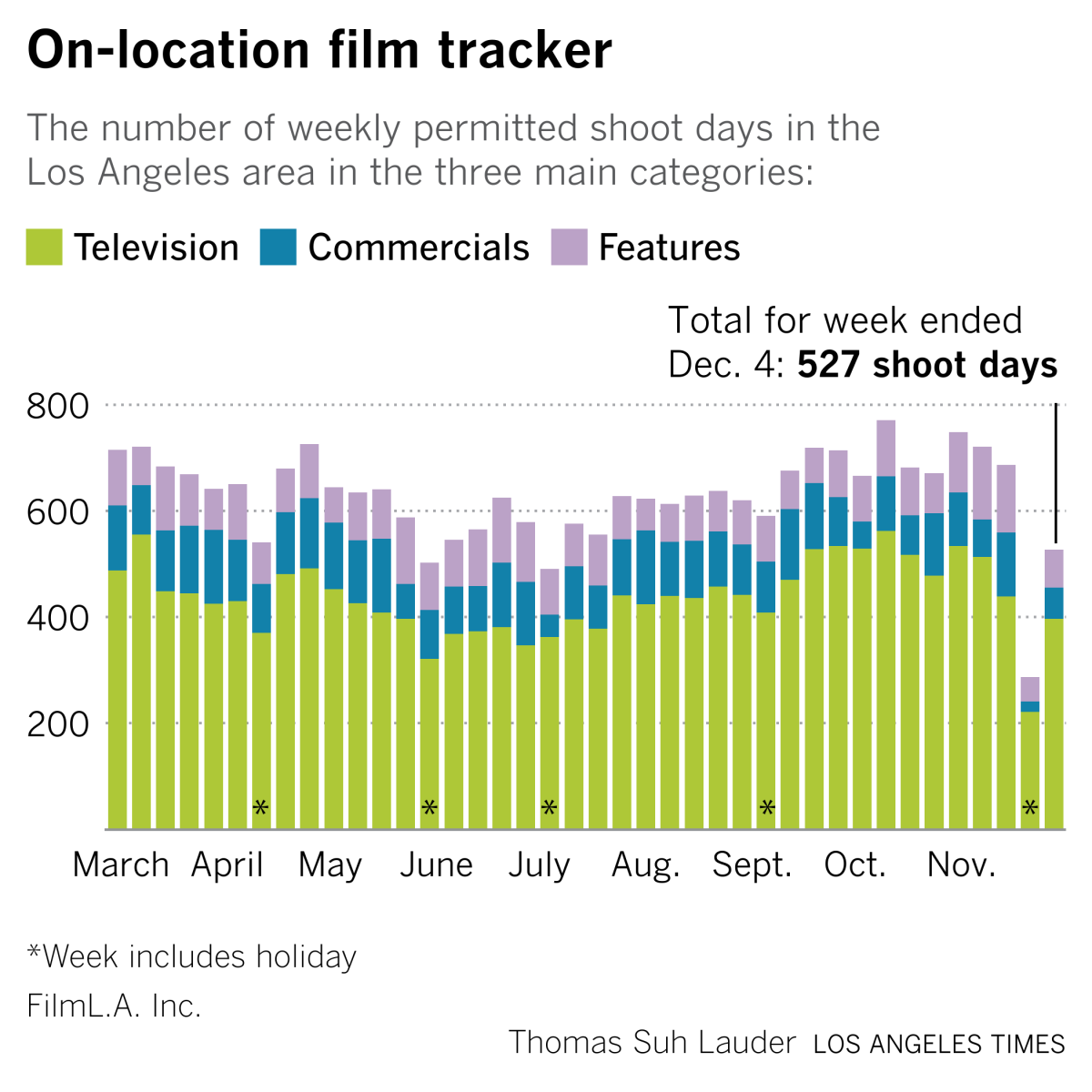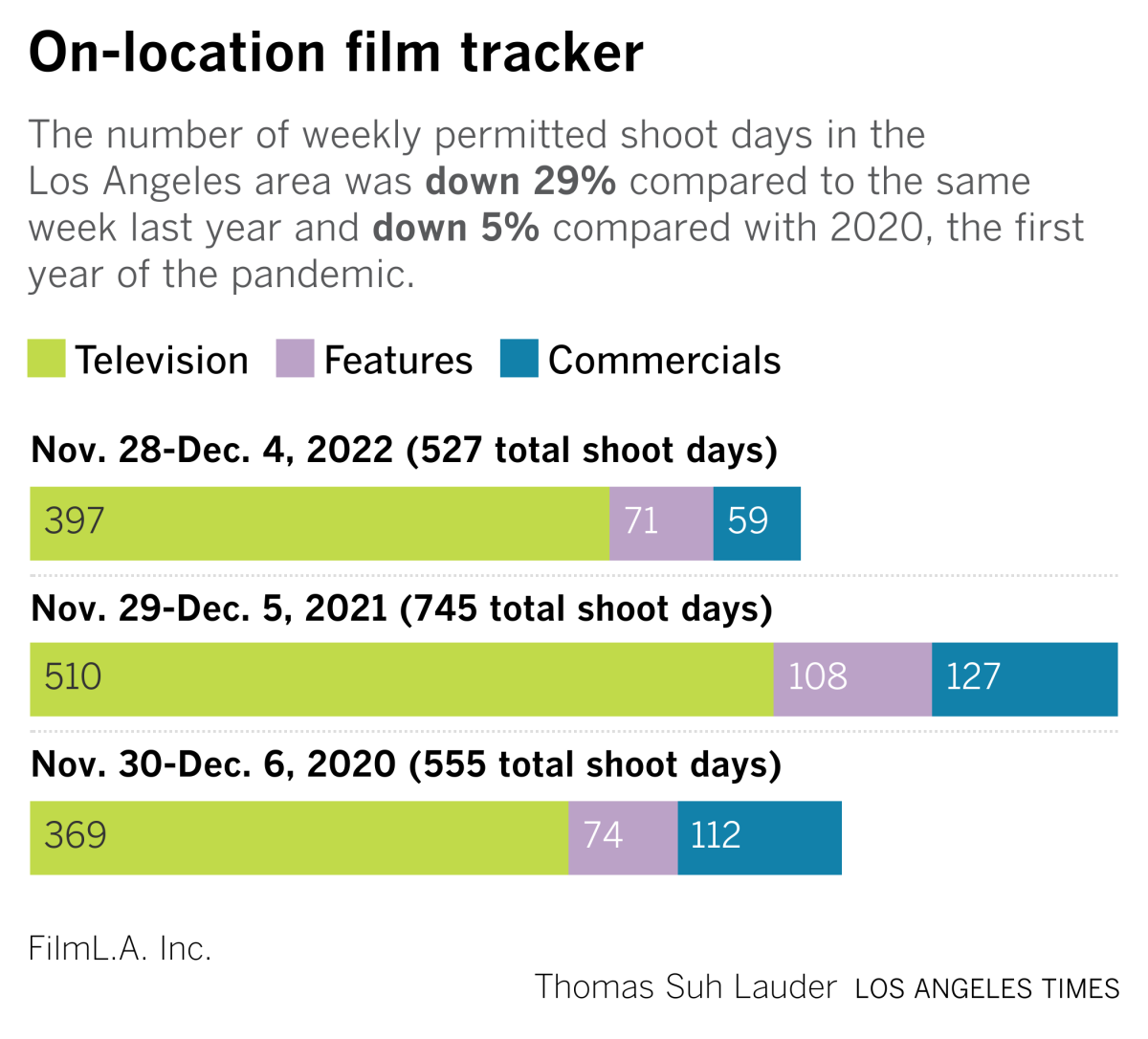James Cameron’s ‘Avatar: The Way of Water’ is a gamble for Disney. But we’ve been here before

Welcome to the Wide Shot, a newsletter about the business of entertainment. Sign up here to get it in your inbox.
Good morning, and congrats to my colleagues for their success at the L.A. Press Club’s National Arts & Entertainment Journalism Awards. Meg James was named print journalist of the year for her work on “Rust” and Randall Emmett. And Stacy Perman was honored for her story about Lora Lee Michel.
For the record:
7:15 a.m. Dec. 6, 2022An earlier version of this article misspelled the last name of Lora Lee Michel.
In the business of entertainment, Jennifer Salke is fully in control at the newly Mark Burnett-less MGM and Amazon Studios, Will Smith is on the post-Slap career revitalization tour and Nickelodeon animation workers have voted to unionize. And “Black Panther: Wakanda Forever” is No. 1 for the fourth week in a row.
Disney’s ‘Water’ world
It’s become accepted wisdom among studios executives: You don’t bet against James Cameron. Just from looking at his career — “Terminator 2: Judgment Day,” “True Lies,” “Titanic” and “Avatar” — it sure seems that making studio executives sweat has been his thing for a while now.
So I own up to a small helping of amusement as Hollywood asks the same questions it always does with a new Cameron project as his latest, “Avatar: The Way of Water,” finally arrives in theaters next week.
“The Way of Water,” which cost a reported $350 million-plus to make, comes 13 years after the original, a long wait for a sequel to a huge blockbuster. The overall box office, still recovering from the COVID-19 pandemic, is unpredictable, to put it generously, but certainly smaller overall than it was in 2019. China is now a bit of a crap shoot for American studios. 3-D, a key factor in the success of the original, has largely gone out of fashion.
And so the industry is waiting to see whether Cameron will prove his critics wrong yet again. Can the long-delayed second “Avatar” make enough money to justify its production and marketing costs, let alone the budgets of “Avatars 3, 4 and 5,” which the Walt Disney Co. already has on its release calendar through 2028? Will it hit the $2-billion mark worldwide? If you haven’t started your office betting pool, now’s the time.
This is familiar ground. Especially for those around when “Titanic” production delays and cost overruns fueled speculation that the 1997 movie would be a disaster for its co-financiers, 20th Century Fox and Paramount Pictures. “Can we not do this again?” is how one exhausted industry observer, who is not connected to the new movie, put it to me in response to all the “Avatar” chatter.
Ah, but it’s too tempting, especially given the context for Disney.
“Avatar” has the potential to be the most valuable film property Disney got through its $71.3-billion acquisition of 21st Century Fox in 2019. Or at least it’s the most obviously untapped and Disney-fiable one.
The company had already made a theme park attraction from the world of Pandora at its Animal Kingdom in Florida. You can’t say the same for “Aliens” (another Cameron smash) or “Predator.” The timing is perfect for corporate intrigue, with Bob Iger returning as chief executive just weeks before release.
Cameron, judging by recent interviews, is unfazed by the various narratives floated by doubters and even seems to revel in them in his defiantly self-confident way. He’s told more than one reporter that the film will have to be among the top-five highest-grossing pictures of all time to be considered a success, setting the target at $2 billion. Is Cameron exaggerating for effect? Maybe. Box office experts think the film will open with $150 million to $175 million in the U.S. and Canada.
For Cameron to occupy three of the top five all-time box-office slots, instead of his current measly two, “The Way of Water” will have to do repeat business — and a lot of it. The first “Avatar” eventually broke “Titanic’s” record because fans went over and over again. Its original run exceeded $2.7 billion in box office grosses. Through re-releases, including 2021’s run in China and this year’s hype-building stint in U.S. and international theaters, the total haul has grown to $2.92 billion, exceeding “Avengers: Endgame’s” lifetime gross by some $125 million.
There are significant hurdles to reaching such lofty heights. First of all, the movie is more than three hours long, and with some 20 minutes of trailers, that’s a lot to ask of audiences, especially if you want them to go two or three times. This is an issue faced by many a modern blockbuster, including the recent “Black Panther: Wakanda Forever,” which is two hours and 41 minutes.
The new “Avatar” managed to secure its release date in China, but Russia is no longer a market for American movies.
The 3-D aspect could be a concern or an advantage. Yes, 3-D is not the ubiquitous juggernaut people were predicting when “Avatar” revolutionized the technology. But 3-D fell by the wayside because too many movies applied it badly. Whatever you think of “Avatar: The Way of Water,” you can at least assume it’s going to look cool. And after the COVID-19 pandemic closures, audiences are more apt to pay for premium experiences that make moviegoing into more of an event.
The biggest mystery is how many people still care about “Avatar” as a cultural touchstone. It may be the biggest movie ever made (not adjusted for inflation), but its lasting impact doesn’t match that of “Star Wars.”
Cameron has answers for the naysayers. (I truly can’t get enough Cameron profiles right now.)
“If people are less likely to remember Jake Sully than, say, Luke Skywalker, that’s partly because ‘Avatar’ is only one movie into its mythology,” Cameron told the Hollywood Reporter’s Rebecca Keegan. “When you have extraordinary success, you come back within the next three years. ... That’s just how the industry works. You come back to the well, and you build that cultural impact over time. Marvel had maybe 26 movies to build out a universe, with the characters cross-pollinating. So it’s an irrelevant argument. We’ll see what happens after this film.”
That’s really the main thing for Disney as it hopes to turn “Avatar” into a major franchise. Iger was the one who orchestrated Disney’s Fox purchase in the first place. It’s only fitting that the payoff is happening under his own leadership sequel.
Stuff we wrote

— Kareem Daniel and the rise and fall of the Disney executive who helped define the Bob Chapek era. He was the czar deciding the fate of $30 billion a year in program spending. Iger’s move to oust him and dismantle his media and entertainment distribution unit marks an unwinding of what many said was one of Chapek’s biggest mistakes in his nearly three years as Disney’s chief executive.
— How Kanye West went from beloved generational rapper to Hitler apologist. West hit a new low by appearing on Alex Jones’ show with white supremacist Nick Fuentes. What’s behind his spiral from hip-hop hero to far-right troll?
— Hollywood writers promote abortion rights with fundraisers and TV shows. They mobilized after the Supreme Court’s landmark decision this summer to overturn Roe vs. Wade, which provided a constitutional right to abortion. They’ve been pressuring Hollywood studios to take action to support film workers.
— This company is placing its bets on internet stars. Hollywood-based esports and web culture company FaZe Clan recently went public in a reverse merger valued at $725 million — with mixed results.
— ICYMI: Fox News parts ways with Lara Trump as a contributor, citing father-in-law’s presidential campaign. Amazon Prime Video and studios architect Jeff Blackburn to retire. CNN is canceling “Morning Express With Robin Meade,” another cost-cutting casualty. Indie film-game studio Annapurna to launch animation division.
Number of the week

There’s still plenty of life in the “Addams Family” franchise.
Netflix’s “Wednesday,” a young-adult spin on the ghoulish IP, broke the streaming service’s record for hours viewed for an English-language show in its first full week of release. Its 341.2-million hours viewed were enough to top “Stranger Things 4,” which tallied 335 million hours.
“Wednesday’s” success is a big win for Tim Burton, who has found a fitting series to rebound with after a wobbly run of features. But it’s an even more significant victory for Jenna Ortega, who has parlayed early success as a Disney Channel star and horror movie scream queen into her role as the anchor of Netflix’s latest hit.

Notably, this is a show produced by MGM Television, which is now owned by Amazon.
The project was sold to Netflix before Amazon bought MGM Studios. Still, it’s another example of one of the weird quirks of the streaming wars and the gold rush for content. Amazon paid $8.5 billion for MGM in order to mine its library for Prime Video, and now MGM is responsible for the biggest hit on Netflix, its chief rival. At least “Wednesday” proves there’s more blood to squeeze from MGM’s properties.
We’ve written about how exploiting MGM’s treasure trove was never going to be as quick and clean as it might have seemed from the news release announcing the deal. That’s now Jennifer Salke’s problem to handle.
Streamers shudder
The pressure is mounting for entertainment companies to prove that revenue from streaming subscriptions will make up for lost dollars from the traditional pay-TV business. For AMC Networks, that culminated last week in the ouster of its chief executive, Christina Spade, less than three months after she took the job.
AMC Networks Chairman James Dolan, whose family has a controlling stake in the business, offered a bleak assessment of the company, known for “The Walking Dead” and “Better Call Saul.” Deep layoffs are coming. The problem: Its streaming properties — AMC+, Shudder and Acorn TV, among others — aren’t making enough money.
“It was our belief that cord-cutting losses would be offset by gains in streaming,” Dolan said in a memo. “This has not been the case. We are primarily a content company and the mechanisms for the monetization of content are in disarray.”
Similar problems are unfolding across the industry. Despite the ouster of Chapek, the prospect of belt-tightening isn’t going away at Disney. CNN is making severe cuts and canceling shows. Paramount Global has laid people off from its TV studios. With the combined problems of falling ratings, weak advertising and a disruptive transition to new business models, the streaming recession is in full swing.
Best of the web and more
— Elon’s Apple attack draws more attention to how speech is monitored on the internet. (Wall Street Journal)
— In the streaming wars’ cruel paradox, more competition means higher prices. (The Verge)
— Netflix’s DVD mail service still has die-hard fans. But is its demise near? (Associated Press)
— A juicy profile of Puck, a newsletter company for the mogul in your life. (The New Yorker)
— The results of the Sight and Sound Greatest Films of All Time poll are here. (BFI)
Films shoots
Interesting production charts this time, which cover FilmLA numbers for the week after Thanksgiving. Note: There was more activity at the end of 2020 before the COVID-19 surge during that holiday season, when things slowed down more than usual.


Finally ...
Yes, “Saturday Night Live’s” James Austin Johnson does an amazing Trump impression. His Bob Dylan-through-the-years might be even funnier. Also, I guess I need to make time to go watch “Jeanne Dielman,” the new Sight and Sound No. 1.
Inside the business of entertainment
The Wide Shot brings you news, analysis and insights on everything from streaming wars to production — and what it all means for the future.
You may occasionally receive promotional content from the Los Angeles Times.




